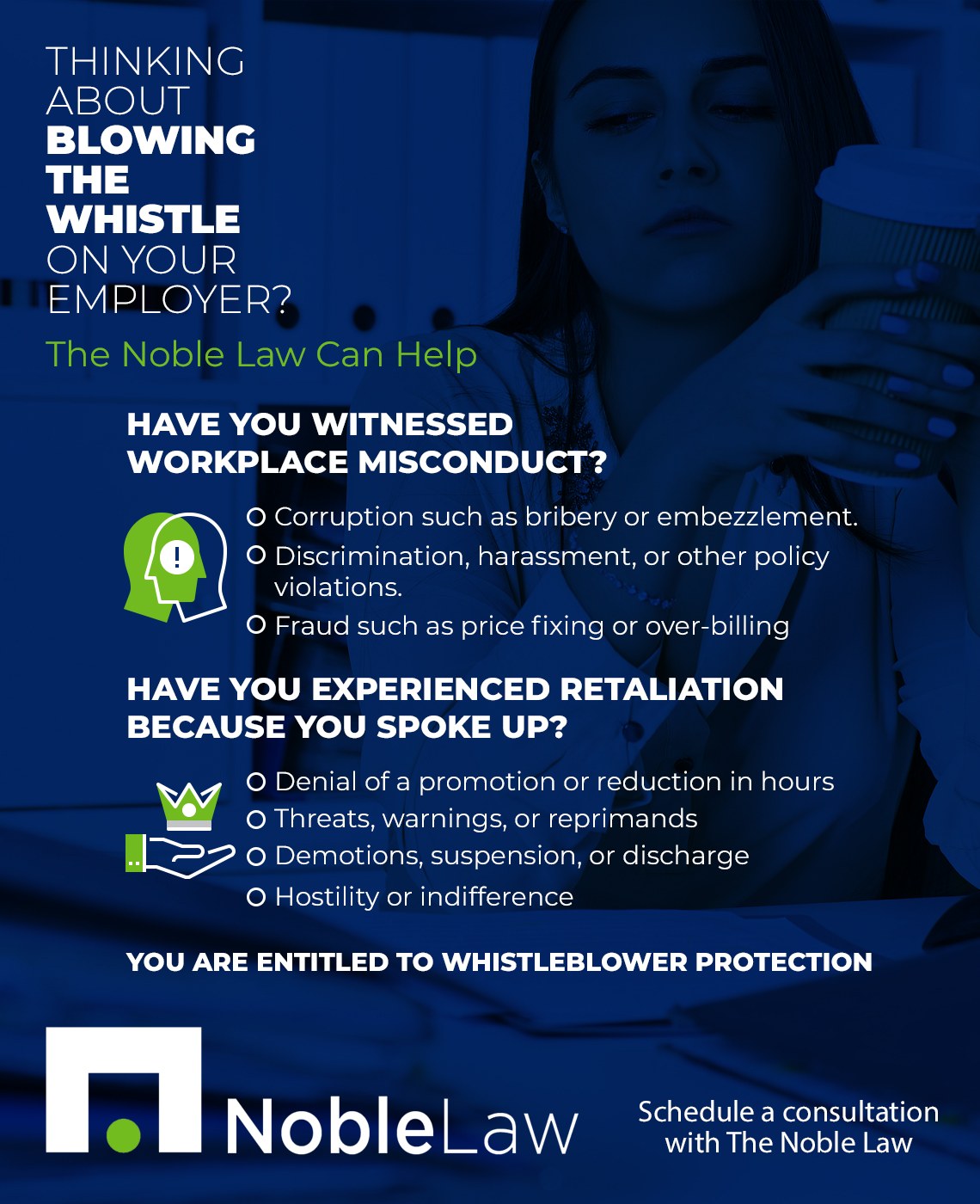Founded in 2009, The Noble Law provides consultations and legal advice to clients in South Carolina and across North Carolina on a variety of employment law issues, including workplace retaliation and whistleblower law. When you choose to partner with us, we will treat you as part of the team and provide you with top-notch, compassionate service. Open communication is key, and our employment law attorneys will support you every step of the way.
When it comes to workplace retaliation, whistleblower protection, or other issues regarding employment law, it can be hard to reach out to an employment attorney. Here at The Noble Law, we will work hard to understand your situation and help you identify your legal options, whether you choose to move forward with our firm or not. Schedule a consultation with a whistleblower lawyer in South Carolina or North Carolina today.



If your employer has retaliated against you for reporting unlawful conduct or engaging in other legally-protected activity, you have important rights you should know about. At The Noble Law, we are passionate advocates for victims of retaliation and other employment law violations in Chapel Hill and throughout North Carolina. A knowledgeable Chapel Hill workplace retaliation attorney at our firm can help you understand your rights and stand up for you in the legal system.
What Qualifies as Legally Protected Activity?
The first key piece of a retaliation claim is proving that an employee engaged in activity that is protected by a State or federal law. Typically, this occurs when an employee complains that a law has been violated, so long as they have a reasonable, good-faith belief that a violation has actually occurred.
Here are just a few examples of legally protected activity:
- Reporting unsafe working environments
- Reporting fraud in the workplace
- Reporting discriminatory treatment on the basis of a protected class or category (e.g., race, sex, disability, age, etc.)
- Reporting harassment or a hostile work environment that occurred because of a protected class or category
- Reporting or complaining of improper pay practices
- Requesting job-protected leave under the FMLA to care for a serious health condition
- Requesting an accommodation for a disability
It is very important for employees to be as specific as possible in their complaints regarding what violations they believe occurred, when, who was involved, and why they believe it was a violation of law or workplace safety policies, etc. The employee should also be careful to retain proof of their complaint or report so there’s no question about whether it occurred or whether their complaint was specific enough to put their employer on notice that a potential violation of law occurred.
While there are many examples of protected activity, it is important to note that not all reports are legally protected. For example, complaining that a boss is showing favoritism that has nothing to do with a protected class or category (i.e., isn’t discriminatory) does not typically constitute protected activity.


What Is Workplace Retaliation?
Although most employers take allegations of harassment, discrimination, fraud and other workplace violations seriously, this isn’t always the case. Unfortunately, it’s not uncommon for employers to retaliate against a complainant in an effort to squash the allegation and frighten others from stepping forward.
This is not only unethical, but also illegal under federal and North Carolina employment statutes. If you’ve found yourself in this situation, your best course of action is team up with an experienced employment attorney stat.
This “retaliation” can take many forms, including:
- Demotion or termination
- Assignment of unfavorable job responsibilities
- Exclusion from opportunities
- Unjustified negative performance reviews
- Reduction in hours or pay
- Increased scrutiny
- A hostile work environment
If you suspect you have been the victim of retaliation, take heart—the law is on your side. A powerful network of federal and North Carolina statutes protects you, including Title VII of the Civil Rights Act of 1964 (Title VII), the Fair Labor Standards Act (FLSA) and North Carolina’s Retaliatory Employment Discrimination Act (REDA).
Knowing you have rights is of little use if you don’t have the power and leverage to hold your employer accountable. This is where the services of an experienced workplace retaliation lawyer in Chapel Hill can make a world of difference.
How Will a Lawyer Build a Successful Retaliation Claim?
Whether your employer is retaliating against you for reporting sexual harassment, blowing the whistle on fraud, or taking any other protected action, a skilled Chapel Hill workplace retaliation lawyer can give you the best possible chance of prevailing in the legal system.
Every case is unique, but some of the key steps in building a successful retaliation claim include:
Gathering Evidence
Evidence in a retaliation case may include emails, employment records and witness testimony that proves:
- You engaged in protected activity: In the context of a workplace retaliation claim, protected activities include reporting discrimination, harassment, or unsafe working conditions. Protected activities also include filing a complaint, participating in an investigation, or refusing to participate in unlawful practices.
- Your employer retaliated against you: A successful claim will also rely upon evidence that your employer took retaliatory action against you, such as those outlined in the section above.
Evidence can fade over time, which is one reason you should consult with an experienced workplace retaliation attorney in Chapel Hill as soon as possible.
Drawing Crucial Links
Once we establish that you engaged in a protected activity and your employer took adverse action against you, the next step is proving that the two are connected. It’s important to remember that not all negative workplace experiences qualify as retaliation—employers can make decisions for legitimate reasons or sometimes for no clear reason at all.
However, if the adverse action occurred shortly after your protected activity, or if there is evidence suggesting your employer had retaliatory intent, the connection becomes more apparent. Demonstrating this link is essential for a strong retaliation claim, as it helps prove that your employer’s actions were not just coincidental, but a direct response to your protected activity.
Navigating Legal Procedures
Workplace retaliation claims involve strict deadlines, extensive documentation, and multiple legal channels, making the process overwhelming for employees unfamiliar with employment law. An experienced workplace retaliation attorney ensures that all required complaints and claims are properly filed with agencies such as the Equal Employment Opportunity Commission (EEOC), the Occupational Safety and Health Administration (OSHA), or the appropriate state department of labor.
Your attorney will help determine which agency has jurisdiction over your case, advise you on the best legal course of action, and ensure that all necessary forms and evidence are submitted within the required timeframes. Missing a filing deadline or failing to include critical details could weaken your case or result in dismissal. Additionally, legal professionals can guide you through administrative hearings, mediation, and potential litigation, providing expert representation at every stage.
By having an attorney handle these legal complexities, you increase your chances of securing a favorable outcome while reducing the stress of navigating the system alone.



How You Can Help Us Succeed
While a dedicated Chapel Hill workplace retaliation lawyer can handle the difficult aspects of your legal claim, there are things you can do on your end to increase the likelihood of a successful result.
- Document everything: Keep detailed records of your protected activity, such as filing a complaint or reporting misconduct, and any adverse actions taken against you afterward. Such information may include emails, performance reviews, and any other relevant documents.
- Identify potential witnesses: Did a coworker, manager or other person witness your protected action or the retaliatory response? Do they know of anyone else who suffered retaliation after engaging in similar protected activity? Their testimony can provide crucial support for your claim.
- Maintain professional conduct: Continue performing your job to the best of your ability, provided that your mental or physical health is not at risk. Keeping up with your professional responsibilities increases your credibility and deprives your employer of legitimate reasons for giving you adverse treatment.
- Mind the statute of limitations: The timeline for notifying certain government agencies that retaliation occurred can be as little as 180 days. After you preserve your claim by notifying the appropriate government agency, you generally have three years to file a workplace retaliation claim in North Carolina. The sooner you act, the sooner your employment lawyer can begin building a strong case on your behalf.
When you are ready, one of the most important things you can do to ensure a successful claim is to consult with an experienced Chapel Hill workplace retaliation lawyer. An attorney who has handled this type of case before and possesses a deep understanding of the case law and relevant statutes can help you understand the strength of your claim and make the right decisions going forward.
A Trusted Ally for Employees in Chapel Hill, NC
Filing a retaliation claim can be a difficult, even frightening experience. Remember, you don’t have to face this process alone. A skilled and compassionate Chapel Hill workplace retaliation lawyer at our firm can provide you with the guidance and advocacy you need. The sooner you take action; the sooner you can get the justice you deserve and put this behind you. Contact us today for a confidential legal consultation.

Learn More
You deserve a safe, ethical, and legal workplace, and our employment law firm is here to help you protect your rights. If you have questions about whistleblower protections available to you in North Carolina or South Carolina, contact The Noble Law.
Here at The Noble Law, we listen. We hear you. We understand. Call today to discuss your rights and duties as a workplace whistleblower.
Along with representing clients with claims in the area of workplace retaliation and whistleblower protections, we also represent employees in a variety of other areas of employment law. These include Executive compensation disputes, Workplace discrimination, Pay, overtime, and leave, Workplace harassment, sexual harassment, and workplace assault, and Workplace investigations.
Learn more about our employment law firm’s Practice Areas and check out our About Page. When you choose to work with The Noble Law, you will gain a clear understanding of your legal options, whether you choose to move forward with our employment law firm or not. Our employment lawyers advise and represent clients in North Carolina and South Carolina, with offices in Charlotte, Chapel Hill, and Mt. Pleasant. If you’re interested in speaking with one of our employment attorneys, contact us today.


